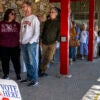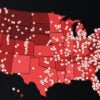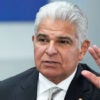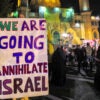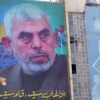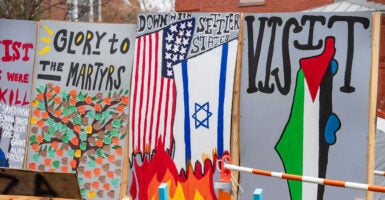With tent cities springing up across American campuses, filled with antisemitic activists who are openly supporting U.S.-designated foreign terrorist organizations, you could be forgiven for suspecting that this activism was not wholly organic. And you would be right.
Fingerprints of Further Funding
Take the “Gaza Solidarity Encampment” at Columbia University, where “students sleep in tents apparently ordered from Amazon and enjoy delivery pizza, coffee from Dunkin’, free sandwiches worth $12.50 from Pret a Manger, organic tortilla chips, and $10 rotisserie chickens,” according to the New York Post. That is not the sort of event a campus student association organizes on its semesterly stipend—certainly not the sort of event a student association could sustain for now more than a week.
It’s not just Columbia University. These tent encampments—with an odd near-uniformity to their pup tents—have popped up at dozens of campuses all across the country. Dozens, scores, and hundreds of students have walked out of classes only weeks before finals, and they are glamping on the lawn instead of cramming in the library. Who is behind all this?
Paid Activists
The Post discovered that at least some encampments appear to be coordinated by paid activists. A left-wing activist coalition called the U.S. Campaign for Palestinian Rights sponsors a “Youth Organizing Fellowship” that offers college students an unheard-of $24-$28/hour wage to organize supposedly “local campaigns,” which are really backed by the training, mentorship, and ongoing support of this extremely well-funded activist network.
In 2023, USCPR hired eight youth fellows, three of which have recently appeared at pro-Hamas encampments at UC Berkeley, Yale, and UT Austin, according to photographs sleuthed out by the Post.
Those who visit the USCPR website today will not find any youth fellows listed. The activist group “has just begun a new class of 2024 youth fellows,” it conveniently claims. Instead, it suggests repeatedly, “Check back for more information,” which innocently suggests to viewers it hasn’t time to update its website yet. However, according to its advertisement, applications for the position closed on April 3, just over two weeks before the recent mayhem on university campuses began.
On one hand, this could be mere coincidence. On the other hand, it could be that USCPR youth fellows (nothing said they had to only hire eight this year) have played a major role in organizing these campus encampments, at least the more influential ones. If that is the case, then USCPR deliberately timed its hiring so that its website would reveal no information about its youth fellows until after their encampment campaign—perhaps even after the semester.
Given the presence of former USCPR youth fellows—who, presumably, are no longer on its payroll—at these protests, it seems likely that its current youth fellows would also be involved, simply due to running in the same circles of protest culture.
The USCPR Network
The USCPR coalition includes Students for Justice in Palestine, Jewish Voice for Peace, CODEPINK, National Lawyers Guild, and the Westchester Peace Action Committee, among many other groups. In 2021, USCPR had a total income of $1.5 million and total expenses of $1 million.
USCPR’s official name is Education for Just Peace in the Middle East. Under that name, USCPR received $355,000 from the Rockefeller Brothers Fund between 2018-2023, and it received $700,000 from the Soros family’s Open Society Foundations between 2018-2022 (the most recent years for which data is available).
In 2018, Tablet Magazine reported that USCPR was “the fiscal sponsor of a group called the Palestinian BDS [Boycott, Divestment, and Sanctions] National Committee (BNC),” which in turn was linked to Palestinian terrorist groups.
One of BNC’s members, listed on its website, is the Council of National and Islamic Forces in Palestine. Five members of PNIF are U.S.-designated terrorist organizations: Hamas, Palestinian Islamic Jihad the Palestine Liberation Front, the Popular Front for the Liberation of Palestine, and the Popular Front – General Command.
For those like me who have never run across the term before, fiscal sponsorship is where one nonprofit receives and administers donations intended for another organization that lacks nonprofit status. (The National Council of Nonprofits argues that the practice does have a place in helping new charities get started, but to the uninitiated outsider this arrangement also looks like a legal way to launder money.) Remember this term, because it will reoccur below.
Local chapters of USCPR affiliate SJP organized many of the Gaza encampments, including those at Columbia, Harvard, Yale, UC Berkeley, Ohio State, and Emory. Also involved in the Columbia occupation is Jewish Voice for Peace, another USCPR affiliate that co-organized an October 2023 protest in which demonstrators illegally entered a House office building and were arrested.
However, USCPR is not the only source of funding for organizations within its orbit organizing campus occupations. From 2017-2022, Soros’ Open Society contributed $775,000 directly to Jewish Voice for Peace, while the Rockefeller Brothers Fund gave the group $490,000 from 2019-2023.
Financial information on Students for Justice in Palestine is harder to obtain because the organization is not registered as a nonprofit. Another USCPR member, the Westchester Peace Action Committee, serves as SJP’s fiscal sponsor.
It makes sense that SJP, which declared Hamas’ Oct. 7 terror attack to be “a historic win for the Palestinian resistance,” would wish to conceal its funding streams. It also makes sense that SJP would not wish to register as a nonprofit organization, since that designation might be justly removed based on its activities and statements. Hence, its secretive funding mechanisms.
Headquartered in White Plains, New York, in Westchester County, the Westchester Peace Action Committee seems like a small, local nonprofit—at first. Nevertheless, WESPAC plays an inconspicuous but important role in supporting the national anti-Israel movement. It does this by allowing itself to be used as a fiscal sponsor to fringe extremist groups that might otherwise lose their tax-exempt status.
According to the left-leaning Anti-Defamation League, WESPAC has fiscally sponsored 22 organizations since 2000, but 15 of those organizations were anti-Israel or pro-Palestine, with no more than one organization in any other category
Due to the lack of reporting requirements, it is unknown how much money WESPAC has funneled to SJP. What is known is that the organization’s revenue nearly quadrupled over four years, from $636,000 in 2021 to nearly $2.4 million in 2023. The sources of most of that revenue are not known.
Tip of the Iceberg
The organization of pro-Hamas campus encampments suggest they are being bankrolled by someone with deep pockets. The lavish supplies expended on the encampments suggest they are being bankrolled by someone with deep pockets. The high compensation paid activists receive to coordinate these encampments suggest they are being bankrolled by someone with deep pockets.
According to open-source data gathering, at least two left-wing grant-making organizations with deep pockets—the Rockefeller Brothers Fund and George Soros’ Open Society Foundations—are known to have made significant past donations to several of the groups involved in these protests.
However, the activist groups already mentioned are not the only members of the left-wing coalition organizing antisemitic direct action on and off university campuses, nor are they the only ones rolling in left-wing donations. Other radical groups have cooperated in staging antisemitic demonstrations:
- If Not Now received $400,000 from Open Society in 2019-2021.
- Adalah Justice Project received $550,000 from the Rockefeller Brothers Fund (passed through the left-wing Tides Center) in 2020-2023.
- The Arab American Association of New York received $60,000 from Open Society in 2018.
- Desis Rising Up and Moving received $30,000 from Open Society in 2020.
All these groups have participated in anti-Israel, pro-Hamas protests.
For those keeping track, the organizations sponsoring campus encampments and other antisemitic protests have received at least $3.36 million since 2016 from just two left-wing organizations. Meanwhile, the funding sources for other groups, such as the hyper-active SJP and Within Our Lifetime, are not known. This is based upon previously reported data that does not even account for funding these organizations may have received since Hamas’ Oct. 7 terror attack—when the lawlessness began in earnest.
Campus protesters like to romanticize their misbehavior by comparing it to the protests of the late-1960s. But today’s protesters have access to more funding than their comrades of another era—perhaps “professors” would be a more efficient word—could have dreamed of. There are likely many deluded campuses today who deeply believe in their confused and perverted vision of the world.
Yet the amount of money involved suggests the campus occupation movement may not be as widespread a grassroots uprising as the left-wing media is laboring to make it appear. Millions, even hundreds of thousands of dollars, can buy significant cooperation from one of the most notoriously penniless segments of society. This is perhaps especially true when the money enables agitators to utter college students’ two favorite words: “free food.”
The Left seems to believe rowdy, disruptive chanting can drive any policy change—so long as the rioters yell loud enough and long enough—and powerful progressive organizations have pulled out their pocketbooks to put that theory to the most rigorous test.
Originally published by The Washington Stand
The Daily Signal publishes a variety of perspectives. Nothing written here is to be construed as representing the views of The Heritage Foundation.

